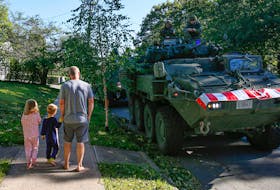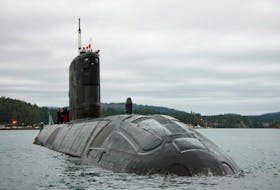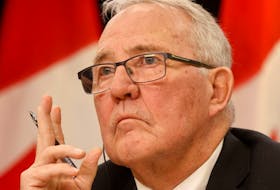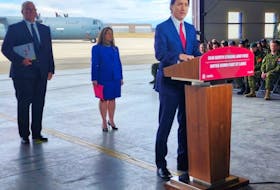Almost completely forgotten amidst the avalanche of news concerning the worldwide COVID-19 pandemic is the ongoing conflict in Iraq.
Canadians should be aware of the deteriorating situation because we still have some skin in the game to the tune of about 850 military personnel.
On March 11, as many as 18 Katyusha rockets slammed into the Allied base in Taji, Iraq, killing three coalition personnel and wounding a dozen others.
No Canadians were reported injured in the attack, but Canadian military trainers are based in Taji. For security reasons the Department of National Defence does not identify exact numbers of personnel deployed to Iraq.
It was believed the attack was carried out by an Iranian-backed Iraqi Shiite militia known as Kataib Hezbollah.
This supports the March 9 testimony made by Canadian Lt.-Gen. Mike Rouleau before a House of Commons committee. Rouleau told the committee that Iranian backed, Iraqi Shiite militia are his No. 1 concern in Iraq because “Daesh has been defeated militarily.”
Astoundingly, Rouleau’s statement caused not a ripple of response despite the magnitude of what his words mean.
Canada first sent troops to Iraq in September 2014 to help the U.S.-led coalition effort to defeat Daesh (aka ISIS, ISIL or IS). At the time, our soldiers were used as trainers to help Kurdish militia in the fight against Daesh.
Allied with us in that effort were a large number of Iranian backed, Iraqi Shiite militia. One of the reasons for this was that the U.S. trained and equipped Iraqi government army had simply melted away the minute Daesh appeared on the battlefield.
Now Rouleau is saying that our erstwhile allies in the successful battle to defeat Daesh are Canada’s biggest threat. That raises the question: When did Canada authorize our troops’ participation in an inter-factional civil war in Iraq?
In addition to an ill-defined role for Canadian special forces personnel in Iraq, Canadian troops are deployed to that country to assist in a NATO-led initiative to train Iraqi government forces.
This initiative involves about 250 Canadian soldiers and the overall NATO mission is commanded by Canadian Maj.-Gen. Jenny Carignan.
Carignan and the majority of those trainers have been relocated to Kuwait since early January following the U.S. targeted killing of Iranian Gen. Qasem Soleimani.
Iran vowed revenge and this sentiment was echoed by the Iraqi Shiite militia which Soleimani once commanded.
It was considered best to suspend the training in Iraq and have Carignan and company sit things out in Kuwait until the dust settles. The DND website assures us that these personnel “remain ready to return to their mission when conditions are right to do so.”
Even if rooted in blind optimism, that statement runs in stark contrast to reality of the situation on the ground in Iraq.
The Canadian-led NATO training mission is tasked with training an Iraqi government army. The problem with that is that Iraq does not have a functioning government. When last summer’s parliamentary election failed to produce a verifiable result it was determined that a recount be conducted. Before that could happen the warehouse containing the ballots burned down. I kid you not.
Last November, interim prime minister Adel Abdul Mahdi was forced to step down following nationwide violent protests. In recent weeks it appeared that a man named Tawfiq Allwai was set to form a government and serve as prime minister. Internal dissent collapsed those plans on March 2, extending the power vacuum.
At present, the most powerful figure in Iraq is the Shiite warlord Muqtada al-Sadr, who leads the coalition of Shiite militia.
If they are now the biggest threat to Canadian military personnel it is time we walk away from this conflict.
The U.S. does not have the luxury of walking away from this mess because they set it in motion in 2003 when they invaded Iraq under the pretext of securing non-existent weapons of mass destruction. Like the sign says in the China shop “if you break it, you bought it.”
Canada did not break Iraq. Bring our troops home now.









